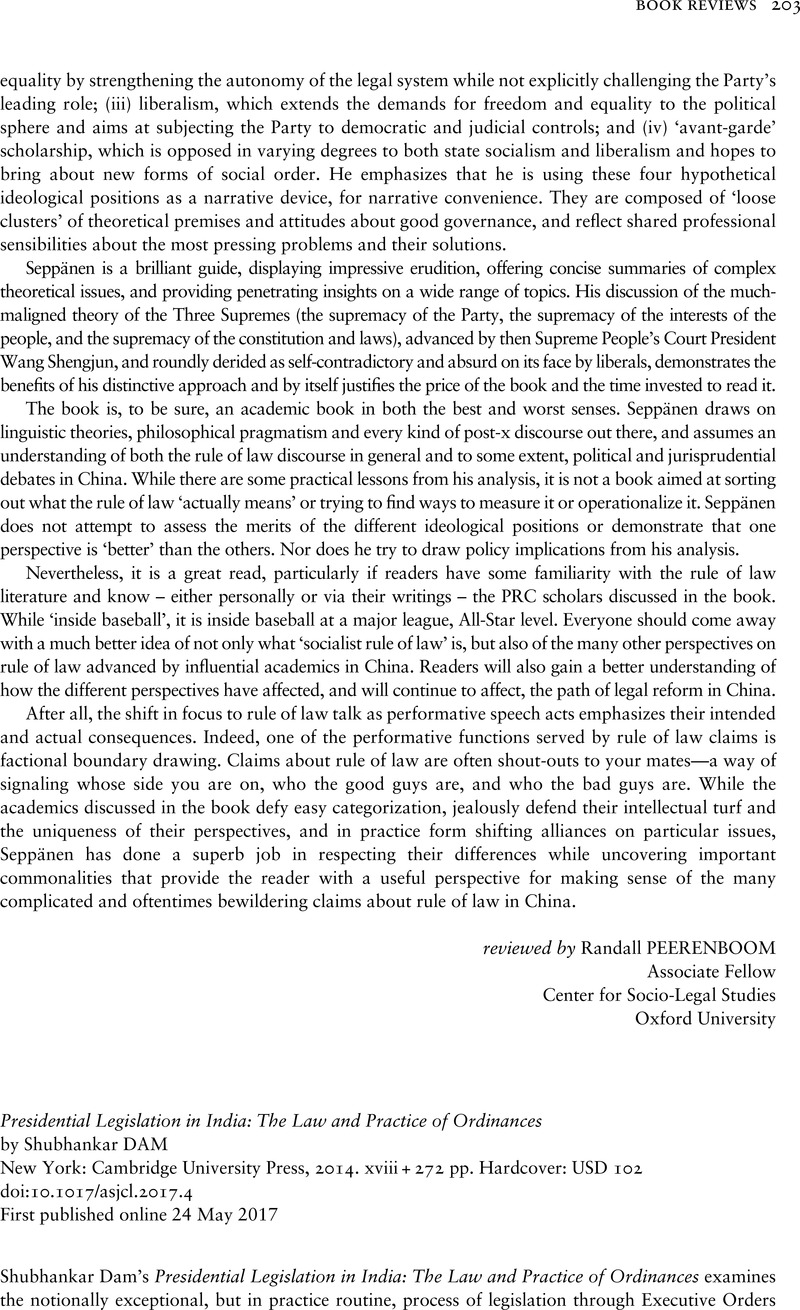No CrossRef data available.
Article contents
Presidential Legislation in India: The Law and Practice of Ordinances by Shubhankar DAM New York: Cambridge University Press, 2014. xviii+272 pp. Hardcover: USD 102
Published online by Cambridge University Press: 24 May 2017
Abstract

- Type
- Book Reviews
- Information
- Copyright
- © National University of Singapore, 2017
References
1. Constitution of India 1950, art 123. Under article 213, State governments have an analogous power.
2. ibid.
3. ibid.
4. D C Wadhwa, Re-promulgation of Ordinances: A Fraud on the Constitution of India (Gokhale Institute of Politics and Economics 1983).
5. PRS Legislative Research, ‘Session Track: Monsoon Session 2016’ (PRS Legislative Research, 12 August 2016) <www.prsindia.org/sessiontrack/monsoon-session-2016/productivity> accessed 13 November 2016.
6. Jürgen Habermas, Between Facts and Norms: Contributions to a Discourse Theory of Law and Democracy (William Rehg trans, MIT Press 1996).
7. Jeremy Waldron, ‘The Dignity of Legislation’ (1995) 54(2) Maryland Law Review 633, 640.
8. For example, in previous work, I have found that the Executive routinely gives domestic effect to international law through its rule-making power – thus bypassing Parliament in the internalization of international law. Aparna Chandra, ‘Fostering Respect? The Supreme Court of India’s Approach to International Law: A Call for Caution’ (JSD thesis, Yale Law School 2013) 96-106.
9. Ram Jawaya Kapur v State of Punjab AIR 1955 SC 549.
10. For example, the Government recently introduced the Aadhaar (Targeted Delivery of Financial and Other Subsidies, Benefits and Services) Bill, 2016 as a Money Bill under article 110, which allowed them to avoid taking the Bill to the Rajya Sabha where the Government did not have the numbers and was likely to face pushback. See generally Arghya Sengupta, ‘Aadhaar Project: Last Chance for a Welfare State’ The Indian Express (New Delhi, 8 April 2016) <http://indianexpress.com/article/opinion/columns/aadhaar-project-uidai-last-chance-for-a-welfare-state/> accessed 13 November 2016 (justifying the Executive’s disregard for bicameralism).
11. See eg, Liz Mathew, ‘Lok Sabha: Opposition Wants to Debate Attacks on Dalits, Govt Says No Need’ The Indian Express (New Delhi, 4 August 2016) <http://indianexpress.com/article/india/india-news-india/dalit-attacls-opposition-demand-debate-lok-sabha-government-says-no-need-2952364/> accessed 13 November 2016.
12. See eg, ‘Government’s Fresh Bid to End Parliament Deadlock, All-Party Meet on Monday’ NDTV (New Delhi, 2 August 2015) <www.ndtv.com/india-news/governments-fresh-bid-to-end-parliament-deadlock-all-party-meet-on-monday-1202947> accessed 13 November 2016. See generally Vernon Hewitt and Shirin M. Rai, ‘Parliament’ in Nirja Jayal and Pratap Bhanu Mehta (eds), The Oxford Companion to Politics in India (Oxford University Press 2010), 35 (discussing the impact of disruptions).
13. Clause 2(b) of the Tenth Schedule to the Constitution of India provides that a parliamentarian shall be disqualified from membership ‘if he votes or abstains from voting in such House contrary to any direction issued by the political party to which he belongs or by any person or authority authorised by it in this behalf, without obtaining, in either case, the prior permission of such political party, person or authority and such voting or abstention has not been condoned by such political party, person or authority within fifteen days from the date of such voting or abstention.’ See also Kihoto Hollohan v Zachillhu (1992) Supp 2 SCC 651 (upholding the constitutional validity of the Tenth Schedule).
14. Arun Shourie, The Parliamentary System (Rupa 2007), 25 (arguing that ‘far from the Council of Ministers being accountable to and controlled by Parliament, it is the Council of Ministers precisely because it controls Parliament’).
15. Since 2009, forty-one new ordinances have been promulgated by the Union Executive of which twenty-one have been promulgated by the current government since May 2014.
16. Krishna Kumar Singh v State of Bihar AIR 1998 SC 2288. For a report on proceedings so far before the 7-judge bench, see ‘SC Set to Decide Whether Benefits Conferred By An Ordinance Can Outlive It’ (Live Law, 11 November 2016) <http://www.livelaw.in/sc-set-decide-whether-benefits-conferred-ordinance-can-outlive/> accessed 13 November 2016.




